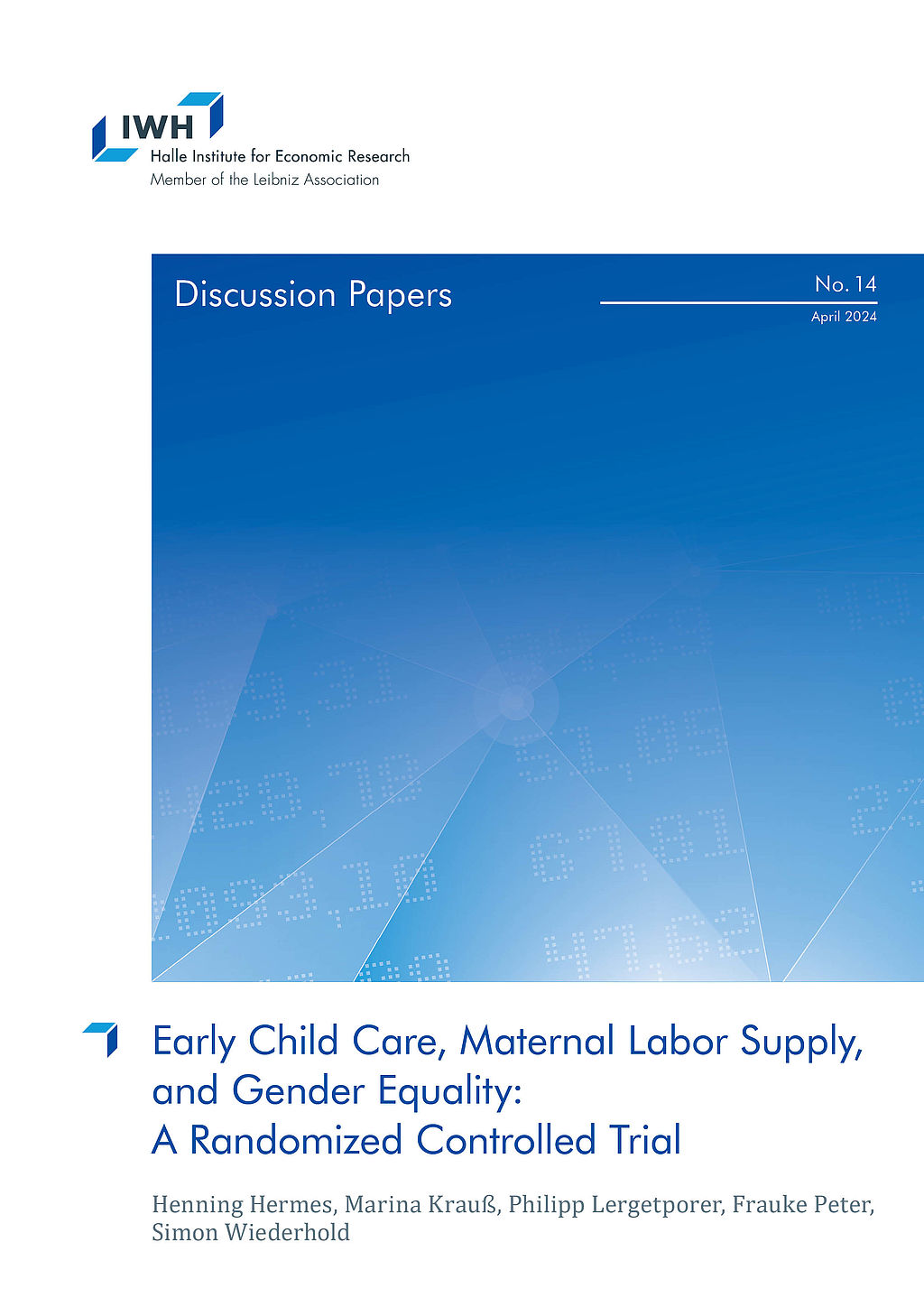
Early Child Care, Maternal Labor Supply, and Gender Equality: A Randomized Controlled Trial?
in: IWH Discussion Papers, No. 14, 2024
Abstract
We provide experimental evidence that enabling access to universal early child care increases maternal labor supply and promotes gender equality among families with lower socioeconomic status (SES). Our intervention offers information and customized help with child care applications, leading to a boost in child care enrollment among lower-SES families. 18 months after the intervention, we find substantial increases in maternal full-time employment (+160%), maternal earnings (+22%), and household income (+10%). Intriguingly, the positive employment effects are not only driven by extended hours at child care centers, but also by an increase in care hours by fathers. Gender equality also benefits more broadly from better access to child care: The treatment improves a gender equality index that combines information on intra-household division of working hours, care hours, and earnings by 40% of a standard deviation, with significant increases in each dimension. For higher-SES families, we consistently observe negligible, insignificant treatment effects.
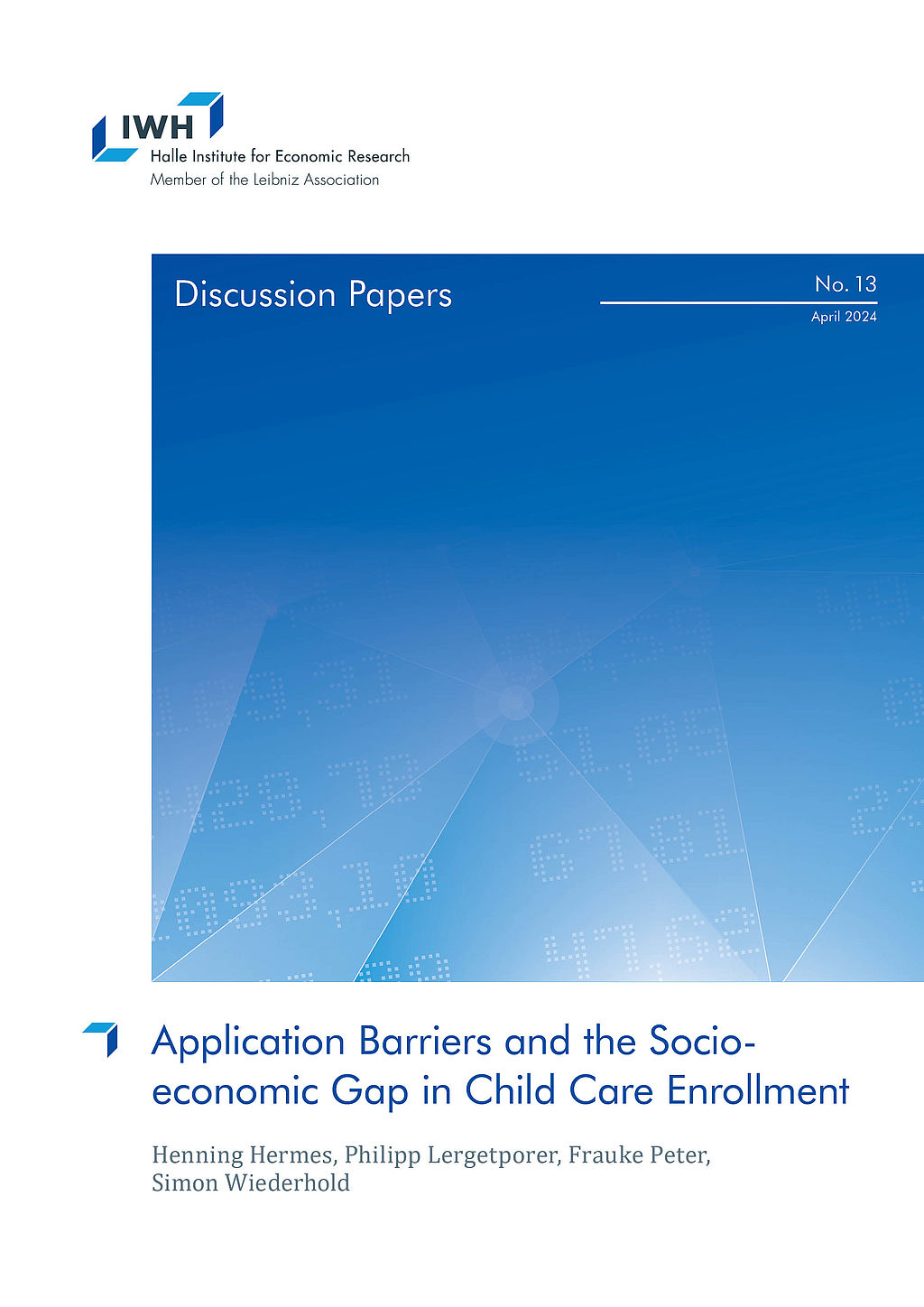
Application Barriers and the Socioeconomic Gap in Child Care Enrollment
in: IWH Discussion Papers, No. 13, 2024
Abstract
Why are children with lower socioeconomic status (SES) substantially less likely to be enrolled in child care? We study whether barriers in the application process work against lower-SES children — the group known to benefit strongest from child care enrollment. In an RCT in Germany with highly subsidized child care (N = 607), we offer treated families information and personal assistance for applications. We find substantial, equity-enhancing effects of the treatment, closing half of the large SES gap in child care enrollment. Increased enrollment for lower-SES families is likely driven by altered application knowledge and behavior. We discuss scalability of our intervention and derive policy implications for the design of universal child care programs.
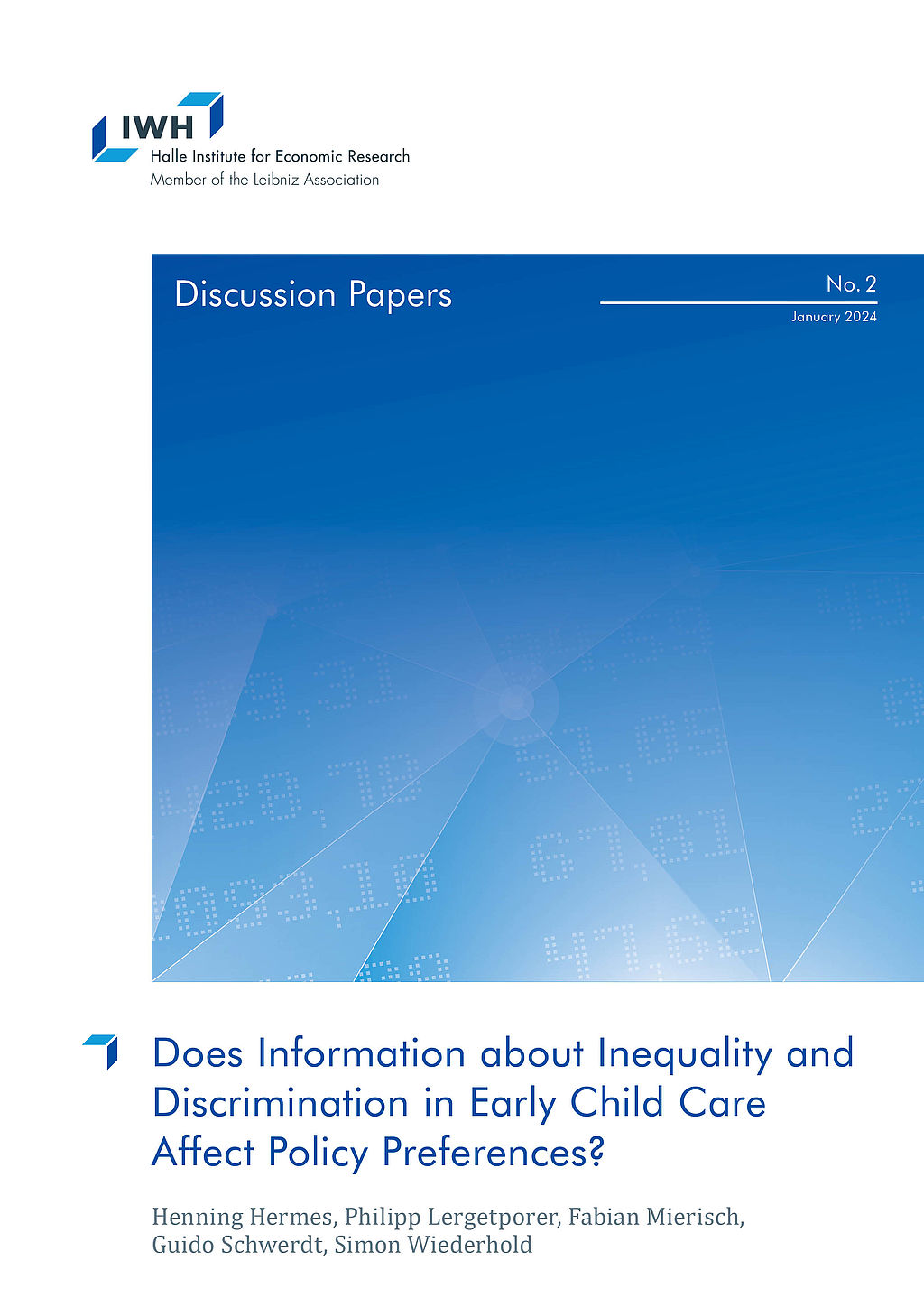
Does Information about Inequality and Discrimination in Early Child Care Affect Policy Preferences?
in: IWH Discussion Papers, No. 2, 2024
Abstract
We investigate public preferences for equity-enhancing policies in access to early child care, using a survey experiment with a representative sample of the German population (n ≈ 4, 800). We observe strong misperceptions about migrant-native inequalities in early child care that vary by respondents’ age and right-wing voting preferences. Randomly providing information about the actual extent of inequalities has a nuanced impact on the support for equity-enhancing policy reforms: it increases support for respondents who initially underestimated these inequalities, and tends to decrease support for those who initially overestimated them. This asymmetric effect leads to a more consensual policy view, substantially decreasing the polarization in policy support between under- and overestimators. Our results suggest that correcting misperceptions can align public policy preferences, potentially leading to less polarized debates about how to address inequalities and discrimination.
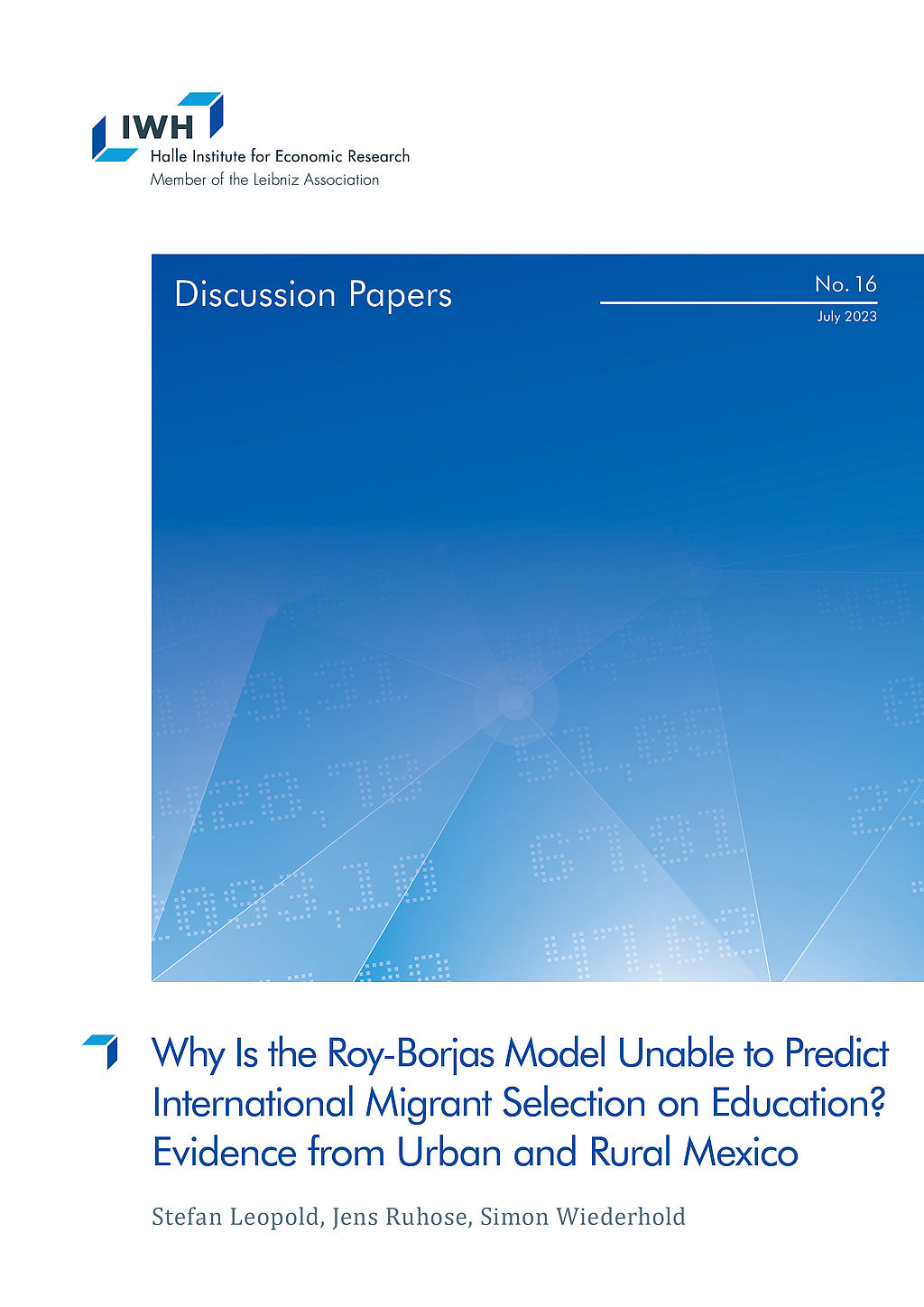
Why Is the Roy-Borjas Model Unable to Predict International Migrant Selection on Education? Evidence from Urban and Rural Mexico
in: IWH Discussion Papers, No. 16, 2023
Abstract
The Roy-Borjas model predicts that international migrants are less educated than nonmigrants because the returns to education are generally higher in developing (migrant-sending) than in developed (migrant-receiving) countries. However, empirical evidence often shows the opposite. Using the case of Mexico-U.S. migration, we show that this inconsistency between predictions and empirical evidence can be resolved when the human capital of migrants is assessed using a two-dimensional measure of occupational skills rather than by educational attainment. Thus, focusing on a single skill dimension when investigating migrant selection can lead to misleading conclusions about the underlying economic incentives and behavioral models of migration.
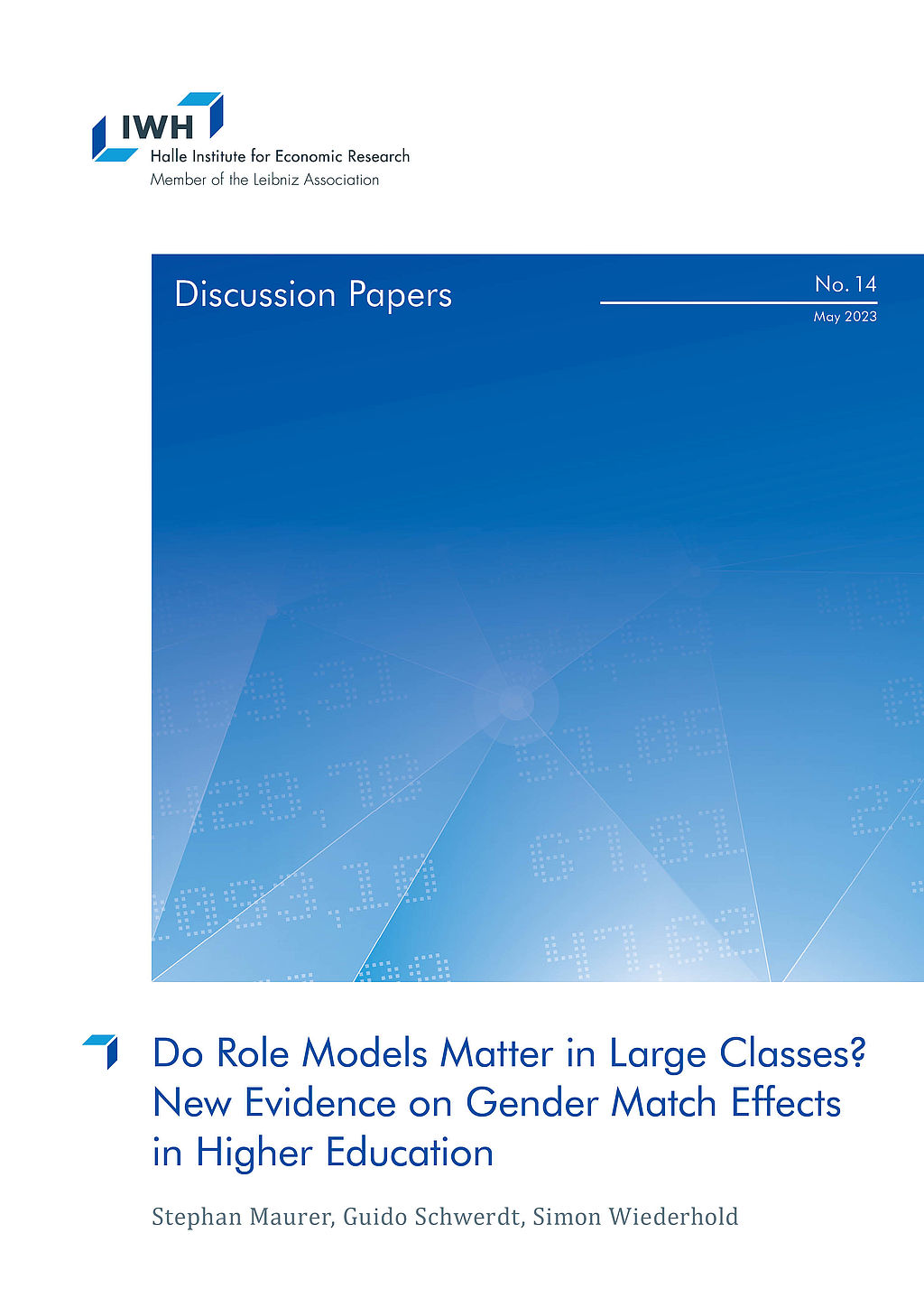
Do Role Models Matter in Large Classes? New Evidence on Gender Match Effects in Higher Education
in: IWH Discussion Papers, No. 14, 2023
Abstract
It is well established that female students perform better when taught by female professors. However, little is known about the mechanisms explaining these gender match effects. Using administrative records from a German public university, which cover all programs and courses between 2006 and 2018, we show that gender match effects are sizable in smaller classes, but are absent in larger classes. These results suggest that direct and frequent interactions between students and professors are crucial for gender match effects to emerge. In contrast, the mere fact that one’s professor is female is not sufficient to increase performance of female students.
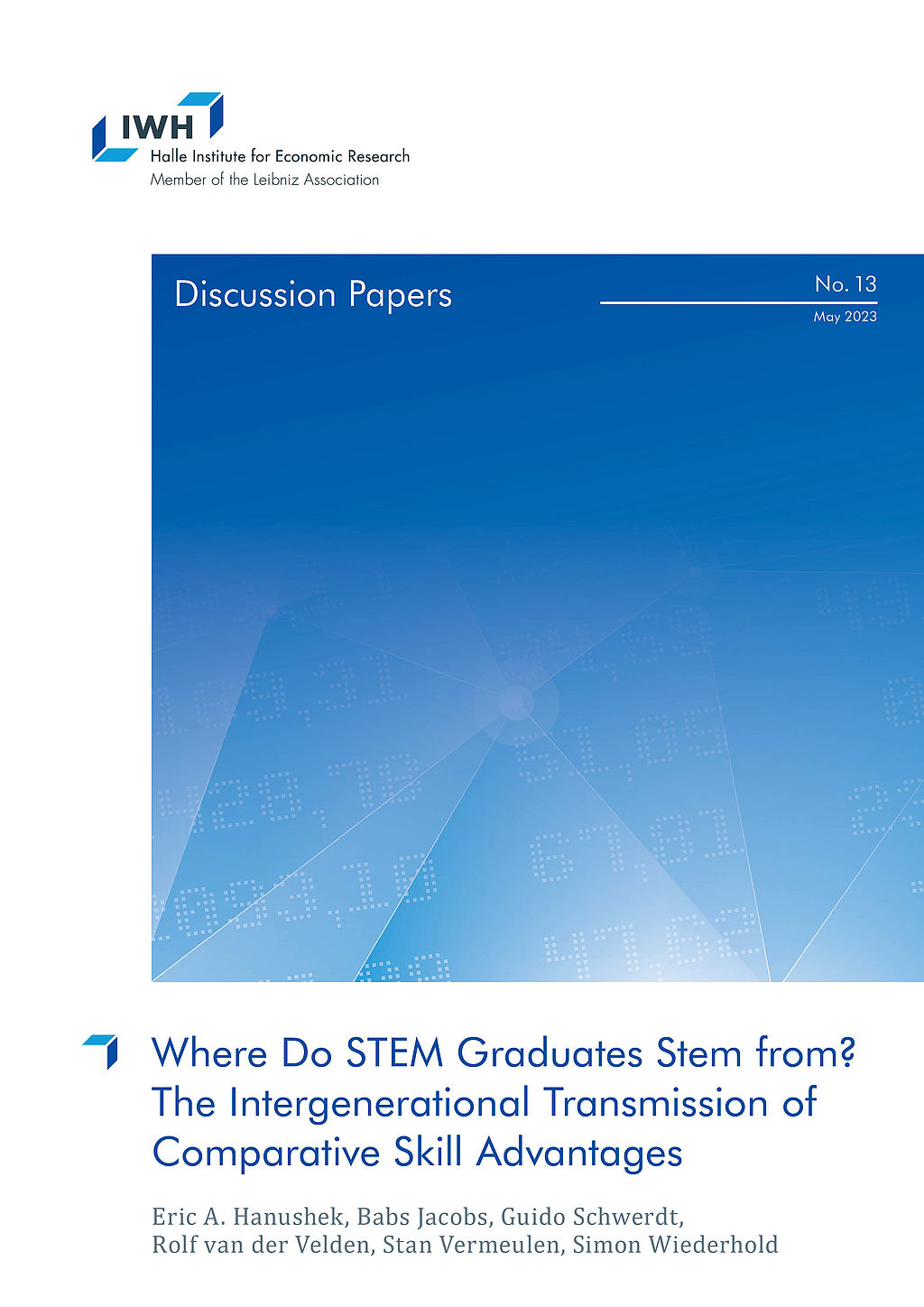
Where Do STEM Graduates Stem from? The Intergenerational Transmission of Comparative Skill Advantages
in: IWH Discussion Papers, No. 13, 2023
Abstract
The standard economic model of occupational choice following a basic Roy model emphasizes individual selection and comparative advantage, but the sources of comparative advantage are not well understood. We employ a unique combination of Dutch survey and registry data that links math and language skills across generations and permits analysis of the intergenerational transmission of comparative skill advantages. Exploiting within-family between-subject variation in skills, we show that comparative advantages in math of parents are significantly linked to those of their children. A causal interpretation follows from a novel IV estimation that isolates variation in parent skill advantages due to their teacher and classroom peer quality. Finally, we show the strong influence of family skill transmission on children’s choices of STEM fields.
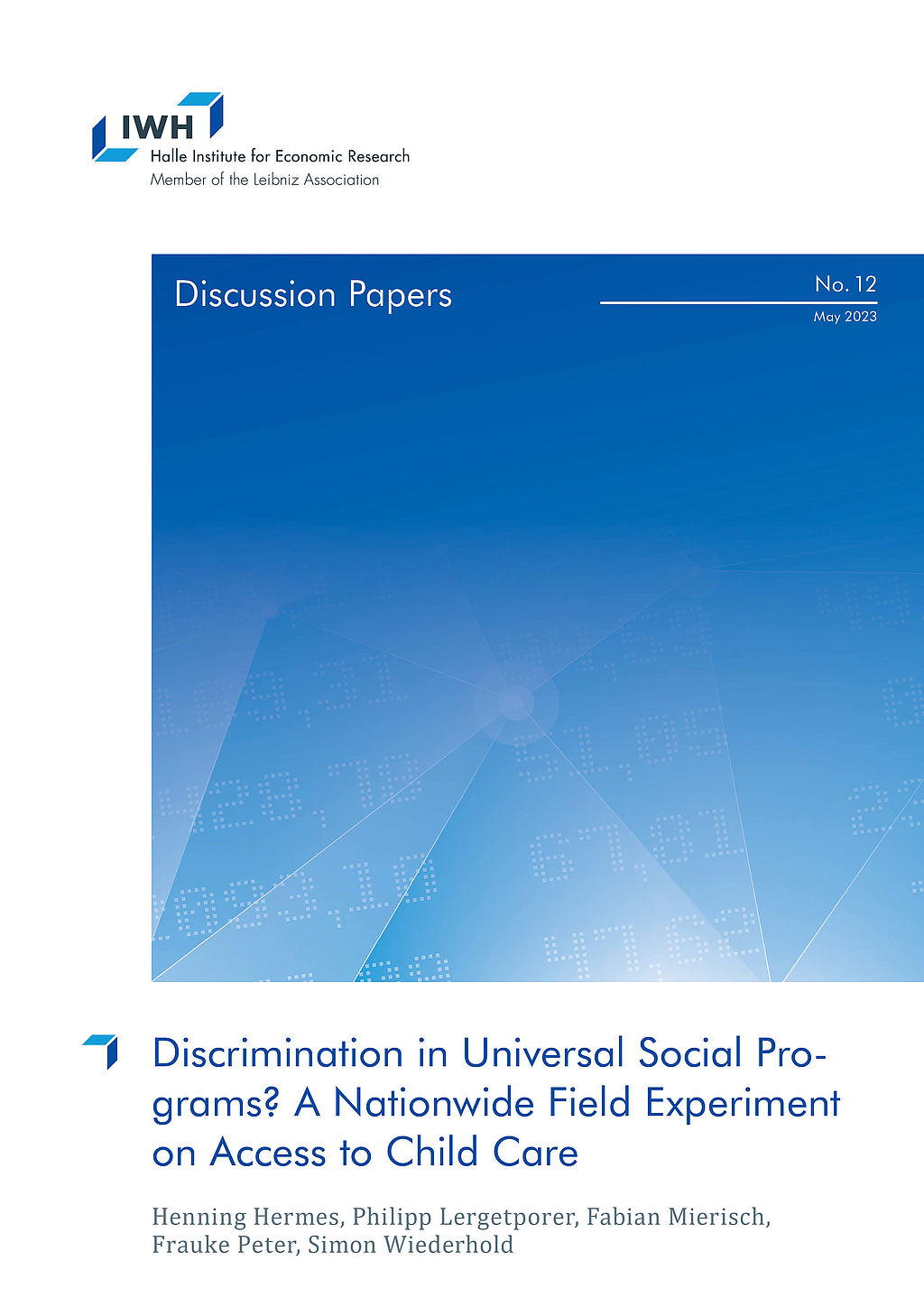
Discrimination in Universal Social Programs? A Nationwide Field Experiment on Access to Child Care
in: IWH Discussion Papers, No. 12, 2023
Abstract
Although explicit discrimination in access to social programs is typically prohibited, more subtle forms of discrimination prior to the formal application process may still exist. Unveiling this phenomenon, we provide the first causal evidence of discrimination against migrants seeking child care. We send emails from fictitious parents to > 18, 000 early child care centers across Germany, inquiring about slot availability and application procedures. Randomly varying names to signal migration background, we find that migrants receive 4.4 percentage points fewer responses. Replies to migrants contain fewer slot offers, provide less helpful content, and are less encouraging. Exploring mechanisms using three additional treatments, we show that discrimination is stronger against migrant boys. This finding suggests that anticipated higher effort required for migrants partly drives discrimination, which is also supported by additional survey and administrative data. Our results highlight that difficult-to-detect discrimination in the pre-application phase could hinder migrants’ access to universal social programs.
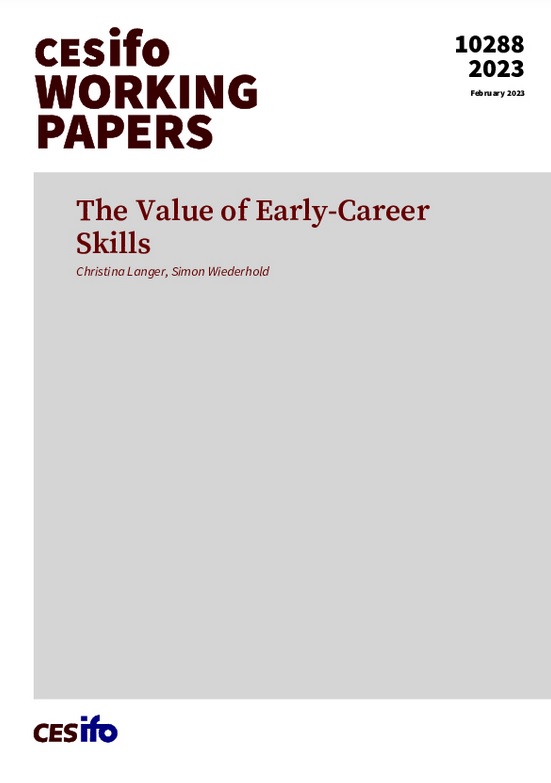
The Value of Early-Career Skills
in: CESifo Working Paper, No. 10288, 2023
Abstract
We develop novel measures of early-career skills that are more detailed, comprehensive, and labor-market-relevant than existing skill proxies. We exploit that skill requirements of apprenticeships in Germany are codified in state-approved, nationally standardized apprenticeship plans. These plans provide more than 13,000 different skills and the exact duration of learning each skill. Following workers over their careers in administrative data, we find that cognitive, social, and digital skills acquired during apprenticeship are highly – yet differently – rewarded. We also document rising returns to digital and social skills since the 1990s, with a more moderate increase in returns to cognitive skills.
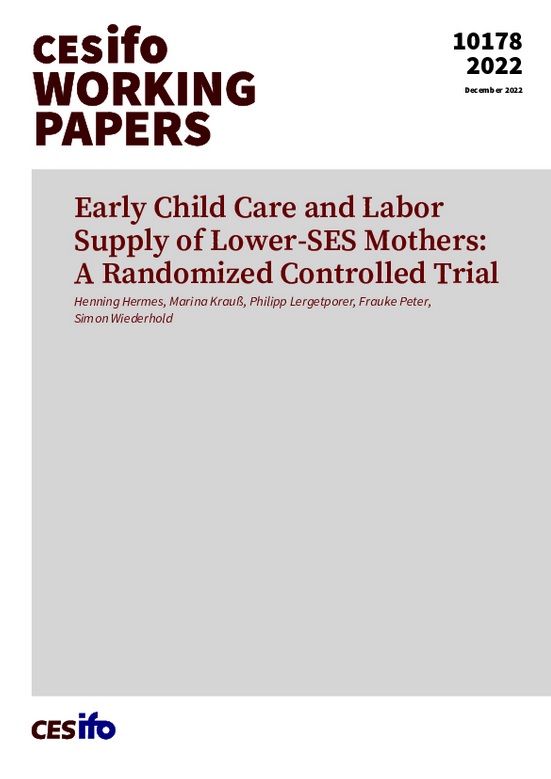
Early Child Care and Labor Supply of Lower-SES Mothers: A Randomized Controlled Trial
in: CESifo Working Paper, No. 10178, 2022
Abstract
We present experimental evidence that enabling access to universal early child care for families with lower socioeconomic status (SES) increases maternal labor supply. Our intervention provides families with customized help for child care applications, resulting in a large increase in enrollment among lower-SES families. The treatment increases lower-SES mothers' full-time employment rates by 9 percentage points (+160%), household income by 10%, and mothers' earnings by 22%. The effect on full-time employment is largely driven by increased care hours provided by child care centers and fathers. Overall, the treatment substantially improves intra-household gender equality in terms of child care duties and earnings.
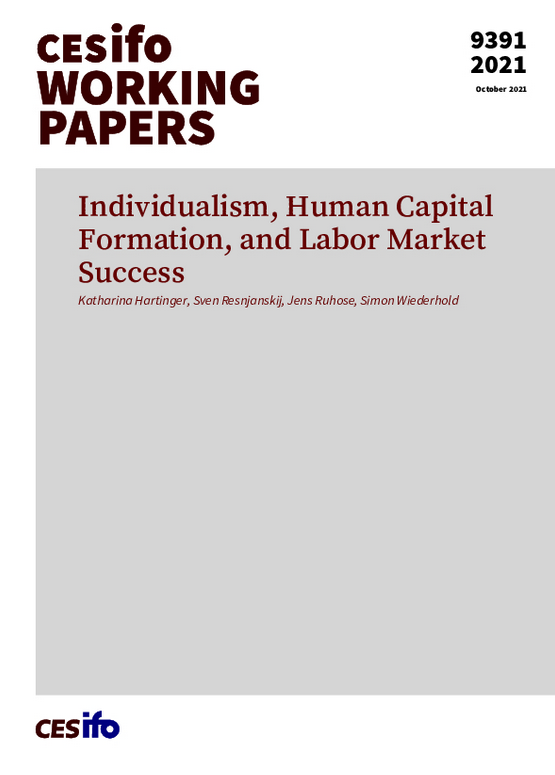
Individualism, Human Capital Formation, and Labor Market Success
in: CESifo Working Paper, No. 9391, 2021
Abstract
There is an ongoing debate about the economic effects of individualism. We establish that individualism leads to better educational and labor market outcomes. Using data from the largest international adult skill assessment, we identify the effects of individualism by exploiting variation between migrants at the origin country, origin language, and person level. Migrants from more individualistic cultures have higher cognitive skills and larger skill gains over time. They also invest more in their skills over the life-cycle, as they acquire more years of schooling and are more likely to participate in adult education activities. In fact, individualism is more important in explaining adult skill formation than any other cultural trait that has been emphasized in previous literature. In the labor market, more individualistic migrants earn higher wages and are less often unemployed. We show that our results cannot be explained by selective migration or omitted origin-country variables.
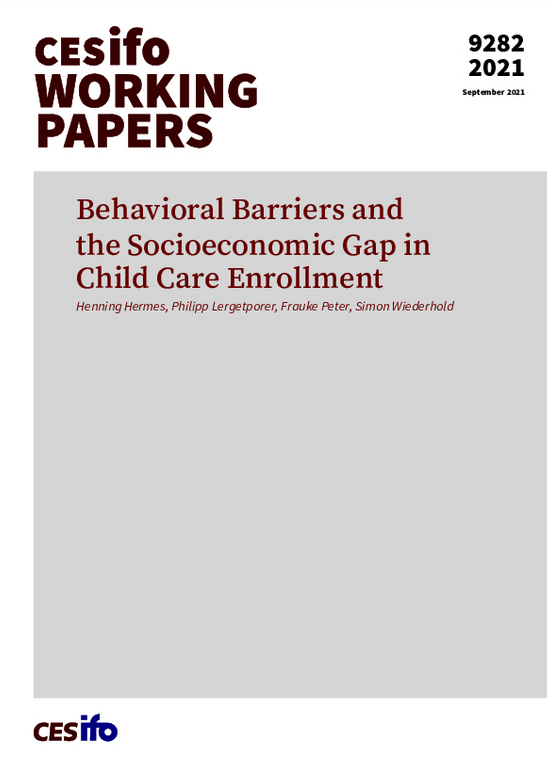
Behavioral Barriers and the Socioeconomic Gap in Child Care Enrollment
in: CESifo Working Paper, No. 9282, 2021
Abstract
Children with lower socioeconomic status (SES) tend to benefit more from early child care, but are substantially less likely to be enrolled. We study whether reducing behavioral barriers in the application process increases enrollment in child care for lower-SES children. In our RCT in Germany with highly subsidized child care (n > 600), treated families receive application information and personal assistance for applications. For lower-SES families, the treatment increases child care application rates by 21 pp and enrollment rates by 16 pp. Higher-SES families are not affected by the treatment. Thus, alleviating behavioral barriers closes half of the SES gap in early child care enrollment.
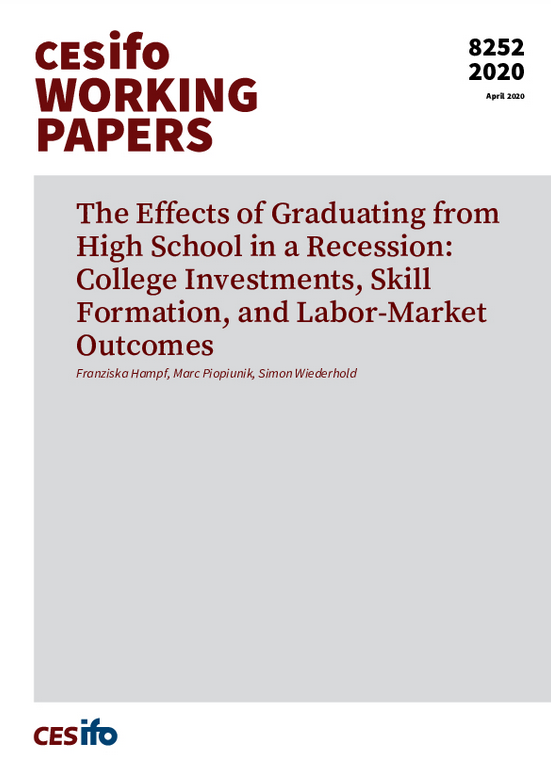
The Effects of Graduating from High School in a Recession: College Investments, Skill Formation, and Labor-Market Outcomes
in: CESifo Working Paper, No. 8252, 2020
Abstract
We investigate the short- and long-term effects of economic conditions at high-school graduation as a source of exogenous variation in the labor-market opportunities of potential college entrants. Exploiting business cycle fluctuations across birth cohorts for 28 developed countries, we find that bad economic conditions at high-school graduation increase college enrollment and graduation. They also affect outcomes in later life, increasing cognitive skills and improving labor-market success. Outcomes are affected only by the economic conditions at high-school graduation, but not by those during earlier or later years. Recessions at high-school graduation narrow the gender gaps in numeracy skills and labor-market success.



